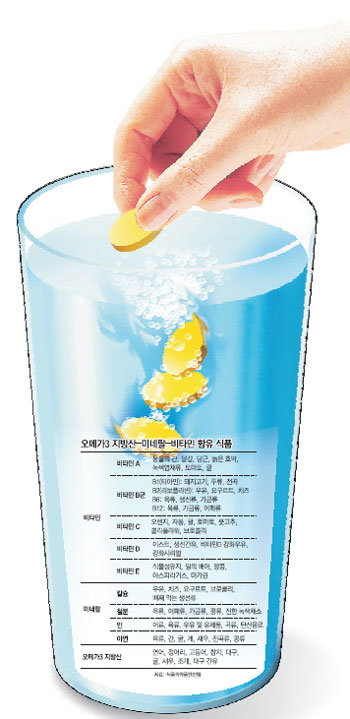[Health] Vitamin Intake Recommendations
[Health] Vitamin Intake Recommendations
Posted August. 25, 2009 17:03,

○ Omega-3 fatty acids high in calories
Omega-3 fatty acids are polyunsaturated fatty acids found in fish. Omega-3 fatty acid supplements on the market contain 1,000 milligrams of fish oil per capsule in which eicosapentaenoic acid (EPA), one of several omega-3 fatty acids, makes up 12 to 18 percent and docosahexaenoic acid (DHA) 10 to 17 percent. Those rich in the fatty acids are deemed good products.
Omega-3 fatty acids benefit people at high risk of cardiovascular disease by reducing the frequency of arrhythmia an irregular pulse - and preventing blood from being sticky.
Studies show that eating fish high in the fatty acids once a week reduces the risk of developing acute myocardial infarction.
Those with hyperlipidaemia, however, should avoid foods rich in omega-3 fatty acids. The acids are not helpful to people suffering from diabetes and obesity, either, since its high calorie aggravates sugar metabolism and leads to obesity.
Goh Yu-ra, a family medicine professor at Seoul National University Hospital, said, Taking four to 10 grams of fish oil is known to deteriorative sugar metabolism.
○ Calcium absorption drops with age
Calcium supplements are also popular among health conscious consumers. A mineral that tends to run short in the body, calcium plays a critical role in bone and tooth formation and muscle relaxation and contraction.
Calcium absorption in adults, however, falls to as low as 30 percent. Women in menopause have an absorption rate of 20 percent since the older one is, the lower the absorption rate. Excessive intake of calcium, however, does not benefit expectant and nursing mothers and the elderly.
The body no longer absorbs calcium if its amount increases beyond a certain level and high calcium intake for the elderly can lead to heart disease, according to certain studies.
The daily calcium intake recommended by the U.S. National Academy of Sciences is 600 milligrams for ages one to three; 1,000 for ages four to eight; 1,200 for ages 19 to 50; and 1,400 for those over 50. Expectant and nursing mothers are recommended to take 1,200 milligrams of calcium every day.
Along with calcium, the elderly should also take caution when taking iron supplements.
○ Vegetarians recommended to take vitamins
An overdose of vitamins can be detrimental to health, all the more so when it comes to fatty vitamins such as vitamins A, D and E.
Excessive intake of Vitamin A leads to dry skin, brittle nails and hair loss. It can also result in anorexia nervosa, fatigue and nervousness.
Liver disease patients and pregnant women should be more careful. For them, continuous intake of more than 50,000 IUs a day is undesirable.
Vitamin E prevents the coagulation of blood platelets, while Vitamin D raises the risk of renal stone formation.
Three meals a day provide most of the vitamins the body needs, Dr. Park Min-sun at Seoul National University Hospital said. People who eat lots of instant foods, avoid vegetables and fruit, and eat little meat such as vegetarians, however, should take vitamin supplements.
nuk@donga.com
Headline News
- Med professors announce intention to leave hospitals starting Thursday
- Bridge honoring Sgt. Moon Jae-sik unveiled in Pennsylvania
- Chief of Staff Chung tells presidential secretaries to stay away from politics
- US FTC bans noncompete agreements
- N. Korea launches cyberattacks on S. Korea's defense companies







